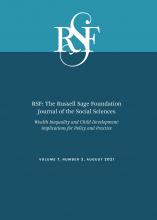Research Article
Open Access
All Wealth Is Not Created Equal: Race, Parental Net Worth, and Children’s Achievement
Jordan A. Conwell, Leafia Zi Ye
RSF: The Russell Sage Foundation Journal of the Social Sciences August 2021, 7 (3) 101-121; DOI: https://doi.org/10.7758/RSF.2021.7.3.05
Jordan A. Conwell
aAssistant professor of sociology and educational policy studies at the University of Wisconsin-Madison, United States
Leafia Zi Ye
bPhD candidate in sociology and an affiliate of the Center for Demography and Ecology at the University of Wisconsin-Madison, United States

REFERENCES
- ↵
- Astor, Maggie
- ↵
- ↵
- Blanchflower, David G.,
- Phillip B. Levine, and
- David J. Zimmerman
- ↵
- ↵
- ↵
- Brown, Tyson H
- ↵
- Carlson, Marcia J., and
- Mary E. Corcoran
- ↵
- Cavalluzzo, Ken S., and
- Linda C. Cavalluzzo
- ↵
- Center for Human Resource Research
- ↵
- Center for Human Resource Research
- ↵
- Chase-Landsdale, P. Lindsay,
- Rachel A. Gordon,
- Jeanne Brooks-Gunn, and
- Pamela K. Klebanov
- ↵
- Conley, Dalton
- ↵
- Darity, William, Jr..,
- Darrick Hamilton,
- Mark Paul,
- Alan Aja,
- Anne Price,
- Anotonio Moore, and
- Caterina Chiopris
- ↵
- ↵
- Duncan, Greg J.,
- Ariel Kalil, and
- Kathleen M. Ziol-Guest
- ↵
- Easton-Brooks, Donald, and
- Alan Davis
- ↵
- ↵
- ↵
- ↵
- Gittleman, Maury, and
- Edward N. Wolff
- ↵
- Hällsten, Martin, and
- Fabian T. Pfeffer
- ↵
- ↵
- ↵
- ↵
- ↵
- ↵
- Keels, Micere,
- Myles Durkee, and
- Elan Hope
- ↵
- Keister, Lisa A
- ↵
- Killewald, Alexandra
- ↵
- ↵
- Killewald, Alexandra, and
- Brielle Bryan
- ↵
- Killewald, Alexandra,
- Fabian T. Pfeffer, and
- Jared N. Schachner
- ↵
- Lewis, Amanda E., and
- John B. Diamond
- ↵
- Lewis-McCoy, R. L’Heureux
- ↵
- Lopez Turley, Ruth N
- ↵
- McLanahan, Sara
- ↵
- McLanahan, Sara, and
- Christine Percheski
- ↵
- Meschede, Tatjana,
- Joanna Taylor,
- Alexis Mann, and
- Thomas Shapiro
- ↵
- Miller, Portia,
- Tamara Podvysotska,
- Laura Betancur, and
- Elizabeth Votruba-Drzal
- ↵
- National Longitudinal Surveys
- ↵
- Nepomnyaschy, Lenna,
- Allison Dwyer Emory,
- Kasey J. Eickmeyer,
- Maureen R. Waller, and
- Daniel P. Miller
- ↵
- ↵
- Oliver, Melvin L., and
- Thomas M. Shapiro
- ↵
- Orr, Amy J
- ↵
- ↵
- Pager, Devah,
- Bruce Western, and
- Bart Bonikowski
- ↵
- Percheski, Christine, and
- Christina Gibson-Davis
- ↵
- Quillian, Lincoln,
- John J. Lee, and
- Brandon Honoré
- ↵
- Reardon, Sean F
- ↵
- ↵
- ↵
- Smith, James P
- ↵
- ↵
- Taylor, Paul,
- Rakesh Kochhar,
- Richard Fry,
- Gabriel Velasco, and
- Seth Motel
- ↵
- Wolff, Edward N
- ↵
- Yeung, W. Jean, and
- Dalton Conley
In this issue
All Wealth Is Not Created Equal: Race, Parental Net Worth, and Children’s Achievement
Jordan A. Conwell, Leafia Zi Ye
RSF: The Russell Sage Foundation Journal of the Social Sciences Aug 2021, 7 (3) 101-121; DOI: 10.7758/RSF.2021.7.3.05
Jump to section
Related Articles
- No related articles found.
Cited By...
- No citing articles found.





